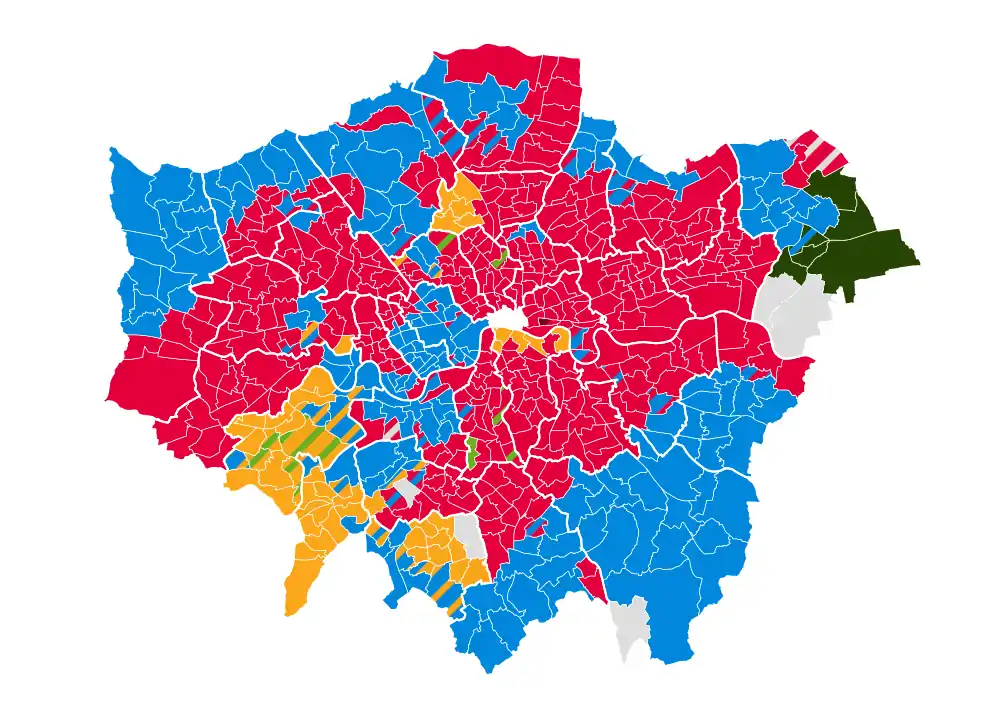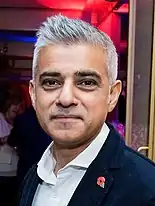2022 London local elections
The 2022 London local elections are due to take place on 5 May 2022, as part of the 2022 United Kingdom local elections. All London borough councillor seats will be up for election. Mayoral elections are also due to take placed in Hackney, Lewisham, Newham and Tower Hamlets, with Croydon electing a mayor for the first time following a local referendum in October 2021.
| |||||||||||||||||||||||||||||
All 1,817 councillors on all 32 London boroughs, and 5 directly-elected mayors | |||||||||||||||||||||||||||||
|---|---|---|---|---|---|---|---|---|---|---|---|---|---|---|---|---|---|---|---|---|---|---|---|---|---|---|---|---|---|
| |||||||||||||||||||||||||||||
.svg.png.webp) | |||||||||||||||||||||||||||||
The previous elections in 2018 resulted in the best outcome for the Labour Party since 1971, while the Conservatives won their lowest number of seats in any local elections in London.
Background

The previous borough council elections in May 2018 saw the London Labour Party achieve their best result in over 45 years, winning 44% of the vote, 1,128 councillors and control of 21 councils. This represented the party's second-best result in a London local election, only surpassed slightly by its 1971 total. The London Conservatives, lost 92 seats to finish with 508 councillors, its lowest-ever tally of seats in a London local election. The London Liberal Democrats won two councils from the Conservatives, the London Green Party won a total of 11 council seats and support for the UK Independence Paty collapsed, with the party losing all of its seats.[1][2][3] In the 2019 general election, there was no net change in the number of seats for each party, although several seats changed hands. The biggest changes in vote share were for Labour, who received 48% of the vote across the city but saw a fall of 6.5 percentage points, and the Liberal Democrats, who were up 6.1 percentage points compared to the previous 2017 general election.
Newham and Tower Hamlets held local referendums in May 2021 on whether to abolish their mayoral positions and return to a leader and cabinet system.[4][5][6] Both resulted in voters choosing to retain the mayoral model.[7] In the same month, the Labour candidate Sadiq Khan was re-elected as the mayor of London, and the 2021 London Assembly election resulted in small gains for the Conservatives, Green Party and Liberal Democrats at the expense of Labour and the UK Independence Party. Croydon Council held a referendum on 7 October 2021 on whether to adopt a mayor position.[8][6] The result was to change to the mayoral system, with the first mayor being due to be elected alongside the council election in 2022.[9]
Twenty-five of the thirty-two boroughs will be electing councillors under new ward boundaries following reviews by the Local Government Boundary Commission for England.[10]
Campaign
In January 2022, the Conservative peer Robert Hayward said that in the wake of the Westminster lockdown parties controversy, his party risked losing control of Wandsworth, Westminster, Barnet and Hillingdon London Borough Councils.[11] Polls of London in January and March 2022 showed Labour with a large lead over the Conservatives. Dave Hill in OnLondon wrote that the poll results would make Labour more confident of making gains in Barnet, Wandsworth, Hillingdon and Westminster, and of winning the new directly-elected mayoralty of Croydon despite financial issues in the borough. He also wrote that the Conservatives were aiming to make gains in Harrow.[12] Nick Bowes, the chief executive of the Centre for London, wrote that Labour gaining control of Barnet and Wandsworth councils would "be a good night for the party in London".[13] The academics Colin Rallings and Michael Thrasher wrote that Labour's strong result in the 2018 election meant "it may be hard for Labour to make much headway or for the Conservatives to fall much further".[14]
A poll by Survation on what issues would affect how people voted showed council tax, the Westminster lockdown parties controversy, and social care quality as the main issues, with far fewer voters ranking low traffic neighbourhood schemes as one of the issues that would most affect how they vote.[15]
The Liberal Democrats launched their local election campaign on 6 April. The party were targetting seats on Merton Council.[16] Labour launched their London local election campaign on 9 April, with the national party leader Keir Starmer and the mayor of London saying that the Conservative government had "abandoned" London and weren't concerned about the rising cost of living.[17]
The journalist Ben Walker, writing in the New Statesman, modelled what the election results would look like according to the voteshares in an April poll by Opinium. His model showed Labour gaining control of Wandsworth and Barnet, with 1,157 to 1,188 seats across the city; while the Conservatives would win between 428 and 452 seats, the Liberal Democrats would win between 149 and 179 seats and the Green Party would win between 11 and 22 seats.[18]
Councils
Mayors
| Council | Mayor before | |
|---|---|---|
| Croydon | Vacant | |
| Hackney | Philip Glanville (Lab) | |
| Lewisham | Damien Egan (Lab) | |
| Newham | Rokhsana Fiaz (Lab) | |
| Tower Hamlets | John Biggs (Lab) | |
Opinion polling
| Date(s) conducted |
Polling organisation/client | Sample size | Lab | Con | Lib Dem | Green | Others | Don't know | Would not vote | Refused | Lead |
|---|---|---|---|---|---|---|---|---|---|---|---|
| 19-22 April 2022 | YouGov/QMUL | 1,232 | 50% | 23% | 12% | 9% | - | - | - | - | 27% |
| 14-20 April 2022 | Opinium/Sky News | 1,000 | 45% | 25% | 12% | 10% | - | - | - | - | 20% |
| 3-7 March 2022 | Deltapoll/London Communications Agency | 1,026 | 54% | 24% | 9% | 5% | 8% | - | - | - | 30% |
| 28 Feb - 3 March 2022 | YouGov/QMUL | 1,114 | 34% | 17% | 8% | 6% | 3% | 9% | 17% | 5% | 17% |
| 3 May 2018 | 2018 elections | n/a | 43.9% | 28.8% | 13.0% | 8.6% | 5.7% | - | - | - | 15.0% |
Notes
- New election boundaries
References
- Grafton-Green, Patrick; Chaplain, Chloe (5 May 2018). "The full list of results for London's local elections". www.standard.co.uk. Retrieved 21 December 2020.
- Stewart, Heather; Walker, Peter (5 May 2018). "Local elections: neither Corbyn nor May able to break poll deadlock". The Guardian. Retrieved 21 December 2020.
- James, William (4 May 2018). "May avoids London wipeout in local elections". Reuters. Retrieved 21 December 2020.
- Hill, Dave (25 September 2020). "Newham: Mayor confirms wish for governance referendum in May as rivals' petition ruled invalid". OnLondon. Retrieved 20 December 2020.
- Burford, Rachael (11 November 2020). "Referendum to scrap Tower Hamlets mayor post will be held next year". London Evening Standard. Retrieved 20 December 2020.
- Chappell, Elliot (15 April 2021). "Local governance referendums taking place this year: what, why and where?". LabourList. Retrieved 19 April 2021.
- Smulian, Mark (10 May 2021). "Referendums back mayoral systems despite mayors' misgivings". Local Government Chronicle (LGC). Retrieved 13 September 2021.
- Hill, Dave (21 September 2020). "Croydon: Referendum on changing to mayoral system cannot take place next May, council leader says". OnLondon. Retrieved 20 December 2020.
- "Croydon referendum: Residents vote for directly elected mayor". BBC News. 8 October 2021. Retrieved 10 October 2021.
- "LGBCE | London Boroughs | LGBCE Site". www.lgbce.org.uk. Retrieved 19 October 2021.
- Bond, David (4 January 2022). "Boris faces worst London results for 50 years, says Tory poll guru". www.standard.co.uk. Retrieved 17 January 2022.
- Hill, Dave (14 March 2022). "New poll gives Labour huge lead in London as borough elections near". OnLondon. Retrieved 23 March 2022.
- Bowes, Nick (30 March 2022). "Nick Bowes: Keys tests for the London borough elections". OnLondon. Retrieved 30 March 2022.
- Rallings, Colin; Thrasher, Michael (6 April 2022). "Labour could struggle to make gains - Rallings & Thrasher's pre-election analysis". Local Government Chronicle (LGC). Retrieved 10 April 2022.
- Talora, Joe (8 April 2022). "Council tax ranked as top local election priority in London". Evening Standard. Retrieved 10 April 2022.
- Harris, Simon (6 April 2022). "Lib Dem leader eyes up London target seats as local election campaign kicks off". ITV News. Retrieved 10 April 2022.
- "Local elections: London abandoned by government, Labour says". BBC News. 8 April 2022. Retrieved 10 April 2022.
- "How will London vote in the 2022 local elections?". State of the Nation. 26 April 2022. Retrieved 27 April 2022.

.jpg.webp)
.jpg.webp)
_(cropped).jpg.webp)